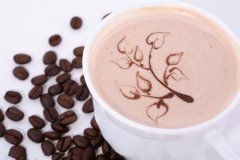Basic knowledge of Coffee what should the elderly pay attention to when drinking coffee
Coffee is the most consumed beverage in the world today. In recent years, there seems to be a "coffee craze" in our country. A considerable number of elderly people, especially elderly intellectuals, have also formed the habit of drinking coffee.

Coffee contains caffeine, which can exhilarate people, eliminate fatigue, improve the activity of the brain, increase appetite and promote digestion. Regular moderate consumption of coffee, but also lose weight, improve exercise ability, improve learning efficiency and other functions. However, if the elderly drink coffee improperly, it can also have an adverse impact on their health. Therefore, we should pay attention to the following points:
1. The coffee drunk by the elderly should not be too strong. Espresso can speed up the heartbeat, cause premature beats, arrhythmia and excessive excitement, insomnia, etc., thus affecting rest and recovery of physical strength. It is even more inappropriate to drink coffee in the evening.
2. Elderly people with arteriosclerosis, high blood pressure and heart disease had better not drink coffee. Research by scientists in the United States shows that patients with heart disease who drink an average of 1 to 5 cups of coffee a day are about 50% more likely to have a heart attack than those who do not drink coffee. Those who drink more than 6 cups a day on average are twice as likely to develop the disease.
Japanese scholars have also proved that coffee drinkers have an increase in blood free fatty acids and blood sugar, lactic acid and pyruvate 2 hours after meals, because caffeine can increase blood lipids.
3. The elderly who suffer from ulcers should not drink coffee. Because, coffee has the effect of stimulating gastric acid secretion, and gastric acid can cause the aggravation of ulcer disease, leading to pain, bleeding and so on.
4. Old people who often drink coffee should pay attention to calcium supplements. It has been determined that drinking 2 cups of coffee will lose 15 milligrams of calcium. Therefore, the researchers pointed out that adults who drink coffee regularly need to supplement 100 milligrams of calcium every day, or drink 1 or 2 cups of milk, and can also eat calcium-rich foods such as beans, cauliflower, sesame paste, shrimp skin and kelp to make up for the loss of calcium caused by drinking coffee.
5. Old people who have drinking habits should not drink coffee after drinking, because caffeine can increase the damage caused by alcohol. Sober up with coffee after drinking is very bad for your health.
6. For the elderly with diabetes, sugar is not suitable for coffee.
Important Notice :
前街咖啡 FrontStreet Coffee has moved to new addredd:
FrontStreet Coffee Address: 315,Donghua East Road,GuangZhou
Tel:020 38364473
- Prev

Matters needing attention in opening a coffee shop Cafe operation
Matters needing attention 1: the location of a coffee shop should be carefully selected. The choice of a coffee shop should not be decided rashly, and the situation around the store should be carefully analyzed, including: the consumption habits and psychology of people around the store, the consumption level, the statistics of passenger flow, the consumer market and the situation of consumers. Only with such a premise can we ensure the profit after opening the store. Make coffee
- Next

Coffee bean grinding tool is electric bean grinder
According to the particle size, it can be divided into: 1. Fine grinding particles are as fine as sugar.
Related
- Beginners will see the "Coffee pull flower" guide!
- What is the difference between ice blog purified milk and ordinary milk coffee?
- Why is the Philippines the largest producer of crops in Liberia?
- For coffee extraction, should the fine powder be retained?
- How does extracted espresso fill pressed powder? How much strength does it take to press the powder?
- How to make jasmine cold extract coffee? Is the jasmine + latte good?
- Will this little toy really make the coffee taste better? How does Lily Drip affect coffee extraction?
- Will the action of slapping the filter cup also affect coffee extraction?
- What's the difference between powder-to-water ratio and powder-to-liquid ratio?
- What is the Ethiopian local species? What does it have to do with Heirloom native species?

